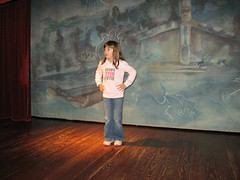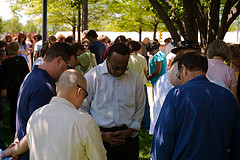During my “play time,” I dreamed of being on stage and teaching. Playing mommy and cuddling doll babies didn’t ever interest me.  However, writing and performing plays was the passion of my playmates and me. While standing before people is our nation’s leading fear, putting me in front of people was comfortable for me. Intuitively, it seemed to be “my place.”
However, writing and performing plays was the passion of my playmates and me. While standing before people is our nation’s leading fear, putting me in front of people was comfortable for me. Intuitively, it seemed to be “my place.”
Additionally, even before I became aware of the value (or problem) of meetings and organizations, I’ve loved the process of organizing people to be able to fulfill a mission or accomplish a task. In junior high and high school, I was part of the student government. I helped run campaigns for my friends, making posters and handing out flyers. I sat through the monthly church business meetings fascinated by the way the meetings were conducted.
Later, as an adult, I learned of people’s fear of being in front of a group. Inwardly, I was surprised because I assumed that everyone was like me.
Perhaps it is a great revelation to each person at some time in his or her life that we are uniquely built.  Like the snowflake, God designs all of us with different needs and desires. Of course, all of us are told this fact but somehow it doesn’t actually connect until adulthood.
Like the snowflake, God designs all of us with different needs and desires. Of course, all of us are told this fact but somehow it doesn’t actually connect until adulthood.
Within the mentally challenged community, that uniqueness is as clear as it is in the rest of us. When I met Allen, I was shocked by his blank personality. Then as I came to know him, I slowly learned the layers of his distinctiveness. He seldom spoke but he possessed a great sense of humor. He was energetic and a planner. Without speaking a word, he would organize the people on the van who were seated by the time he got on the van. Telling them how to get off the van, he directed the willing passengers with his “better way.”
Psalm 139:13 and 14 says, “You made my whole being; you formed me in my mother’s body. I praise you because you made me in an amazing and wonderful way. What you have done is wonderful. I know this very well.” The value of who we are is exquisitely shown within the simple lives of the people in the mentally challenged community. They are people who quietly live in their sub-culture. Often, the rest of the world doesn’t even know this sub-culture exists. However, the developmentally disabled community has leaders and supporters. There are people who are able to control situations and people who desire to give people what they need.
Who are some of your members who impress you because of their ability to show their distinctive personalities and become leaders?

